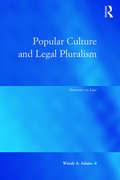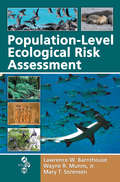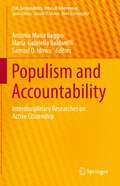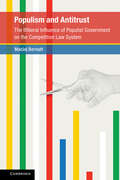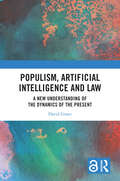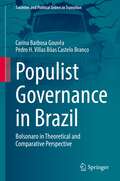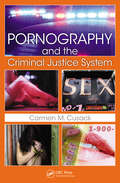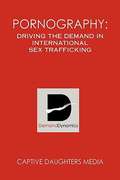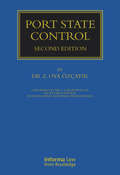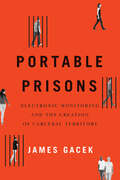- Table View
- List View
Popular Culture and Legal Pluralism: Narrative as Law (Law, Justice and Power)
by Wendy A AdamsDrawing upon theories of critical legal pluralism and psychological theories of narrative identity, this book argues for an understanding of popular culture as legal authority, unmediated by translation into state law. In narrating our identities, we draw upon collective cultural narratives, and our narrative/nomos obligational selves become the nexus for law and popular culture as mutually constitutive discourse. The author demonstrates the efficacy and desirability of applying a pluralist legal analysis to examine a much broader scope of subject matter than is possible through the restricted perspective of state law alone. The study considers whether presumptively illegal acts might actually be instances of a re-imagined, alternative legality, and the concomitant implications. As an illustrative example, works of critical dystopia and the beliefs and behaviours of eco/animal-terrorists can be understood as shared narrative and normative commitments that constitute law just as fully as does the state when it legislates and adjudicates. This book will be of great interest to academics and scholars of law and popular culture, as well as those involved in interdisciplinary work in legal pluralism.
Popular Governance of Post-Conflict Reconstruction
by Matthew SaulUnder what conditions does a post-conflict government have authority? What challenges to its legitimacy does it face? To what standards can it be held accountable? Via case studies of Sierra Leone and Afghanistan and detailed accounts of extant international law, Matthew Saul explores the international legal framework which regulates popular governance of post-conflict reconstruction.
Popular Justice: A History of American Criminal Justice
by Samuel WalkerThis popular one-volume analysis of the evolution of American criminal justice places contemporary issues of crime and justice in historical perspective. Walker identifies the major periods in the development of the American system of criminal justice, from the small institutions of thecolonial period to the creation of the police, the prison, and the juvenile court in the nineteenth century and the search for professionalism in the twentieth century. He argues that the democratic tradition is responsible for the worst as well as the best in the history of criminal justice in theUnited States. Offering a challenging perspective on current controversies in the administration of criminal justice in light of historical origins, the author explores the evolving conflict between the advocates of crime control and the advocates of due process. Now in its second edition, Popular Justice has been completely revised to include the most recent scholarship on crime and justice. Walker has updated his analysis of the history of American criminal justice and explores the tension between popular passions and the rule of law. He examines changingpatterns in criminal activity, the institutional development of the system of criminal justice, and the major issues concerning the administration of justice. Timely and comprehensive, this text will be useful for courses in criminal justice, legal history, and criminology.
Popular Morality in the Early Roman Empire
by Teresa MorganMorality is one of the fundamental structures of any society, enabling complex groups to form, negotiate their internal differences and persist through time. In the first book-length study of Roman popular morality, Dr Morgan argues that we can recover much of the moral thinking of people across the Empire. Her study draws on proverbs, fables, exemplary stories and gnomic quotations, to explore how morality worked as a system for Roman society as a whole and in individual lives. She examines the range of ideas and practices and their relative importance, as well as questions of authority and the relationship with high philosophy and the ethical vocabulary of documents and inscriptions. The Roman Empire incorporated numerous overlapping groups, whose ideas varied according to social status, geography, gender and many other factors. Nevertheless it could and did hold together as an ethical community, which was a significant factor in its socio-political success.
Popular Participation in Japanese Criminal Justice
by Andrew WatsonThis book analyses the mixed courts of professional and lay judges in the Japanese criminal justice system. It takes a particular focus on the highly public start of the mixed court, the saiban-in system, and the jury system between 1928-1943. This was the first time Japanese citizens participated as decision makers in criminal law. The book assesses reasons for the jury system's failure, and its suspension in 1943, as well as the renewed interest in popular involvement in criminal justice at the end of the twentieth century. Popular Participation in Japanese Criminal Justice proceeds by explaining the process by which lay participation in criminal trials left the periphery to become an important national matter at the turn of the century. It shows that rather than an Anglo-American jury model, outline recommendations made by the Japanese Judicial Reform Council were for a mixed court of judges and laypersons to try serious cases. Concerns about the lay judge/saiban-in system are raised, as well as explanations for why it is flourishing in contemporary society despite the failure of the jury system during the period 1928-1943. The book presents the wider significance of Japanese mixed courts in Asia and beyond, and in doing so will be of great interests to scholars of socio-legal studies, criminology and criminal justice.
Popular Sovereignty and the Crisis of German Constitutional Law: The Theory and Practice of Weimar Constitutionalism
by Peter C. CaldwellPopular Sovereignty and the Crisis of German Constitutional Law is a historical analysis of competing doctrines of constitutional law during the Weimar Republic. It chronicles the creation of a new constitutional jurisprudence both adequate to the needs of a modern welfare state and based on the principle of popular sovereignty. Peter C. Caldwell explores the legal nature of democracy as debated by Weimar's political theorists and constitutional lawyers. Laying the groundwork for questions about constitutional law in today's Federal Republic, this book draws clear and insightful distinctions between strands of positivist and anti-positivist legal thought, and examines their implications for legal and political theory.Caldwell makes accessible the rich literature in German constitutional thought of the Weimar period, most of which has been unavailable in English until now. On the liberal left, Hugo Preuss and Hans Kelsen defended a concept of democracy that made the constitution sovereign and, in a way, created the "Volk" through constitutional procedure. On the right, Carl Schmitt argued for a substantial notion of the "Volk" that could overrule constitutional procedure in a state of emergency. Rudolf Smend and Heinrich Triepel located in the constitution a set of inviolable values of the political community, while Hermann Heller saw in it a guarantee of substantial social equality. Drawing on the work of these major players from the 1920s, Caldwell reveals the various facets of the impassioned constitutional struggles that permeated German legal and political culture during the Weimar Republic.
Population Registers and Privacy in Britain, 1936—1984
by Kevin MantonThis book examines the fraught political relationship between British governments, which wanted information about peoples’ lives, and the people who desired privacy. To do this it looks at something that Britain only experienced in wartime, a centralized and up-to-date list of everyone in the country: a population register. The abolition of this wartime system is contrasted with later attempts to reintroduce registration, and the change in the political mind-set driving these later schemes to develop centralised webs of so-called objective data is examined. These policies were confronted by privacy campaigns, studied here, but it is shown how government responses succeeded in turning political debates about data into technical discussions about computerization; thus protecting its data, largely on paper, from oversight. This reformulation also shaped the 1984 Data Protection Act, which consequently did not protect privacy but rather increased government’s ability to gain knowledge of, and hence power over, the people.
Population-Level Ecological Risk Assessment
by Lawrence W. Barnthouse Wayne R. Munns Jr. Mary T. SorensenMost ecological risk assessments consider the risk to individual organisms or organism-level attributes. From a management perspective, however, risks to population-level attributes and processes are often more relevant. Despite many published calls for population risk assessment and the abundance of available scientific research and technical tool
Populism and Accountability: Interdisciplinary Researches on Active Citizenship (CSR, Sustainability, Ethics & Governance)
by Samuel O. Idowu Maria-Gabriella Baldarelli Antonio Maria BaggioThis book takes into consideration the development of different forms of populism in various countries with democratic political systems over the past two decades. Despite the diversity existing between current populisms, common elements have emerged: the tendency to diminish the role of political representation, the centrality of the "charismatic leader," the nationalistic idealization of "people" that undermine international agreements. How do these phenomena affect the instruments, rules, and culture of democracy? Why does populism receive strong acclaim? How can leaders respond to the real needs that can be at the basis of populisms without abandoning democratic principles? Using an interdisciplinary approach which emphasizes accountability and responsibility, this book addresses these and other issues facing current and future corporate leaders. The chapters offer suggestions on how to choose between major worthy causes, how to effectively measure the outcomes of social responsible action, and how to navigate the challenges of accountability. Providing practical tools to combat the root of populism in business and community, this book is intended for practitioners, researchers, and students of business and management, politics, and other related disciplines such as public administration, social science, and the humanities.
Populism and Antitrust: The Illiberal Influence of Populist Government on the Competition Law System (Global Competition Law and Economics Policy)
by Maciej BernattCompetition law is designed to promote a consumer-friendly economy, but for the law to work in practice, competition agencies - and the courts who oversee them - must enforce it effectively and impartially. Today, however, the rule of populist governments is challenging the foundations of competition law in unprecedented ways. In this comprehensive work, Maciej Bernatt analyses these challenges and describes how populist governments have influenced national and regional (EU) competition law systems. Using empirical findings from Poland and Hungary, Bernatt proposes a new theoretical framework that will allow the illiberal influence of populism on competition law systems to be better measured and understood. Populism and Antitrust will be of interest not only to antitrust and constitutional law scholars, but also to those concerned about the future of liberal democracy and free markets.
Populism and Contemporary Democracy in Europe: Old Problems and New Challenges
by Josep Maria Castellà Andreu Marco Antonio SimonelliThis book provides a comprehensive analysis of the impact of populism on the European democratic polity. In the last two decades, European democracies have come under strain amid growing populism. By asserting the superiority of the majority over the law, of direct democracy over representation, and claiming the necessity to defend national sovereignty against foreign interferences, the populist conception of democracy is in stark contrast with the longstanding Western notion of liberal democracy. This volume investigates populist attempts to radically change what Bobbio called the “rules of the game” of democracy from an eminently legal perspective. Weaving together normative and empirical analysis, the contributions focus on the institutions that have suffered the most from the rise of populism as well as those that have better resisted the populist tide. Special attention will be paid to the Venice Commission’s opinions and documents, as they represent the best European standards to evaluate the extent to which populism deviates from constitutional democracy requirements. The book also considers the responses of European States to the explosion of the COVID-19 pandemic. The COVID-19 pandemic has indeed been an accelerator of known and studied trends in most constitutional systems, such as the concentration of powers in the executive hands and the consequential loss of parliament's centrality. Various forms of populism across Europe have thus found an ideal breeding ground to implement their agenda of granting the executive broad regulatory and decision-making powers while loosening parliamentary and judicial checks. Against this backdrop, the book analyses how European democracies should adapt to the challenges posed by the pandemic, as this reflection can help respond to populist threats and propose a way forward for liberal democracy.
Populism, Artificial Intelligence and Law: A New Understanding of the Dynamics of the Present
by David GrantPolitical systems across much of the West are now subject to populist disruption, which often takes an anti-Constitutional form. This interdisciplinary book argues that the current analysis of anti-Constitutional populism, while often astute, is focused far too narrowly. It is held here that due to an obscured complex of dynamics that has shaped the history of the West since its inception and which remains active today, we do not understand the present. This complex not only explains the current disruptions across the fields of contemporary religion, politics, economics and emerging artificial intelligence but also how these disruptions derive each from originary sources. This work thereby explains not only the manner in which this complex has functioned across historical time but also why it is that its inherent, unresolvable flaws have triggered the shifts between these key fields as well as the intractability of these present disruptions. It is this flawed complex of factors that has led to current conflicts about abortion reform, political populism, the failure of neoliberalism and the imminent quantum shift in generative artificial intelligence. It is argued that in this, law is heavily implicated, especially at the constitutional level. Presenting a forensic examination of the root causes of all these disruptions, the study provides a toolbox of ideas with which to confront these challenges. This is a book of originality and significance, which will make fascinating reading for academics and researchers working in the areas of Socio-legal Studies, Legal Philosophy, Political Science, Theology, AI and Neuroscience.The Open Access version of this book, available at http://www.taylorfrancis.com, has been made available under a Creative Commons Attribution-Non Commercial-No Derivatives (CC-BY-NC-ND) 4.0 license.
Populist Challenges to Constitutional Interpretation in Europe and Beyond (Comparative Constitutional Change)
by Zoltán Szente Fruzsina Gárdos-OroszThis book explores the relationship between populism or populist regimes and constitutional interpretation used in those regimes. The volume discusses the question of whether contemporary populist governments and movements have developed, or encouraged new and specific constitutional theories, doctrines and methods of interpretation, or whether their constitutional and other high courts continue to use the old, traditional interpretative tools in constitutional adjudication. The book is divided into four parts. Part I contains three chapters elaborating the theoretical basis for the discussion. Part II examines the topic from a comparative perspective, representing those European countries where populism is most prevalent, including Austria, Croatia, the Czech Republic, Greece, Hungary, Italy, Poland, Romania, Spain, and the United Kingdom. Part III extends the focus to the United States, reflecting how American jurisprudence and academia have produced the most important contributions to the theory of constitutional interpretation, and how recent political developments in that country might challenge the traditional understanding of judicial review. This section also includes a general overview on Latin America, where there are also some populist governments and strong populist movements. Finally, the editors’ closing study analyses the outcomes of the comparative research, summarizing the conclusions of the book. Written by renowned national constitutional scholars, the book will be essential reading for students, academics and researchers working in Constitutional Law and Politics.
Populist Governance in Brazil: Bolsonaro in Theoretical and Comparative Perspective (Societies and Political Orders in Transition)
by Carina Barbosa Gouvêa Pedro H. Castelo BrancoThis book addresses the field of populisms from a contemporary perspective. The book brings a conceptual, qualitative, culturally sensitive and transformative approach to containing populist governance. The authors set out not only examine and compile the most varied conceptual definitions, but also present a theoretical definition in which they recognize a myriad of variable properties of populisms which are strategies commonly used in specific political contexts. Furthermore, with its own methodology, the book shows the use of a working method whose analysis was designed to apply the definition of populism applicable in any national context and answer the following hypothesis: the political and normative actions undertaken in the political system could be characterized as a populist movement in its formal and/or informal aspects, directly or indirectly? In this perspective, variable properties are attributes that allow to establish a traceable relationship through a set of specific indicators for its operationalization and empirical tests. The book also applies the definition of populisms in the political and normative actions undertaken by Jair Messias Bolsonaro in Brazil, presenting an extensive repertoire of mechanisms which understanding could contribute to contain populism, with the proper adaptations to the characteristics of each context. Reading Populisms will certainly contribute to the readers having more conceptual tools to analyze this global phenomenon that threatens the building of democratic constitutionalism as well as to understand how the growth of populism is associated with the weaknesses of liberal democracy.
Por qué miramos a los animales
by John BergerNadie como el premio Booker John Berger para enseñarnos a ver y a vernos. «Desde D. H. Lawrence no ha habido un escritor como Berger, capaz de ofrecer al mundo tal atención sobre los problemas humanos más disímiles, con una sensualidad que no renuncia a los imperativos de la conciencia y la responsabilidad».Susan Sontag John Berger revolucionó nuestra manera de ver el arte, la sociedad y la naturaleza, animándonos a mirar el mundo como si se tratara de la primera vez. Este libro es una buena muestra de ello: variando en tono desde la anécdota tierna hasta el ensayo profundo, el ganador del Premio Booker se pregunta cómo y por qué nos hemos vuelto incapaces de ver realmente a los animales, a los que hemos convertido en muñecos, juguetes y personajes de cuentos infantiles. Berger nos ofrece un diagnóstico, pero también una salida: la solidaridad entre oprimidos, la creación de un lenguaje común y una nueva mirada emancipadora tanto para el que mira como para el que es mirado.Alfaguara recoge los ensayos, algunos inéditos en castellano, que Berger dedicó a nuestra relación con los animales y a diversas luchas sociales en un libro que muestra una vez más la sensibilidad y el compromiso del autor en temas de intensa relevancia actual. La crítica ha dicho...«Su obra parece labrada con una precisión de relojero, y una intimidad que podría confundirse con ternura».The New York Times Book Review «Fue el Leonard Cohen de otra clase de rotunda melancolía: la de la tristeza (social, íntima) que provoca el auténtico saber en mitad de la sociedad capitalista de fauces abiertas y hambre incansable».Diego Medrano, El Comercio«Berger es el fecundo, sugerente e irónico escritor de las verdades».Manuel Rivas «Una de las voces esenciales para comprender el estado de nuestra sociedad [...]. Combina a la perfección compromiso y reflexión».El Confidencial «Sus contemporáneos más cercanos en términos de audacia estética podrían ser Umberto Eco o el tardío W. G. Sebald, pero resulta difícil compararlo a cualquier autor inglés del último medio siglo. Berger, simplemente, rompió todos los moldes».The Guardian «Fue la voz de los frágiles, residuos del mundo moderno a los que su obra otorgó dignidad de reyes [...]. Poeta, novelista, ensayista y crítico de arte, toda su obra literaria es el testimonio de alguien que contempla un universo que se desvanece ante sus ojos».Javier Rodríguez Marcos, El País «Un faro de luz tenue pero inagotable, constante, esperanzada».Àlex Susana, Ara «Los libros de Berger poseen la peculiar cualidad de parecer libros solo por azar. Hechos de palabras, las portan, sin embargo, con indulgencia, casia regañadientes, como si igual pudieran estar hechos de lienzo y pintura o, aún mejor, de polvo y paja, barro y hueso».Herald Tribune
Por qué volvías cada verano
by Belén López PeiróEl libro que terminó con el secreto alrededor del abuso y se convirtió en clave de cientos de denuncias. «Hay libros que son hechos. Este es uno: se puede leer como una novela, como una denuncia, como la propia construcción. Porque es todo eso: una novela polifónica, el relato de un abuso padecido en la adolescencia en manos de un hombre armado, un tío poderoso, el macho de la familia y del pueblo. Y un hecho: acá está la mujer que fue la nena que ese tipo quiso romper para su uso personal. Y está toda entera, fuerte, hablando de lo que da tanta vergüenza hablar. Escribiendo contra todos los que intentaron callarla. Contra sí misma, incluso, a veces. Este libro es una batalla: la que ganó Belén López Peiró iniciando un juicio, buscando asesoramiento legal en un sistema que no les prodiga justicia a las víctimas, contándoles a todos sus parientes y vecinos, obligándolos a ver lo que no querían ver. Y escribiendo, haciendo de su propia experiencia una obra exquisita, una intervención política poderosa. Y muy necesaria».Gabriela Cabezón Cámara La crítica dijo: «El mapa de aquello que nos sucede, por fin al completo. Imprescindible».Brigitte Vasallo «Para mí un libro definitivo sobre el abuso sexual, además del descubrimiento de una voz de la que quiero leer mucho más».Nuria Labari «No, no es un libro para disfrutar. Es un libro para entender, para empatizar, para hacer real lo que no muchas se atreven a decir en alto».Andra.eus «Por eso la forma de este libro es tan perfecta o precisa para abordar la violencia machista, porque consigue hacer emocionalmente muy palpable la complejidad del entramado que sostiene la impunidad, el ruido de los juicios de los otros en la cabeza de una víctima, cuando no hay jerarquías, ni valoraciones, ni justicia. Solo la nítida ajenidad de todos ante la experiencia propia de la vulnerabilidad».Gabriela Wiener, elDiario.es «Belén López Peiró relata el abuso sexual sin ambigüedades, pero con mucha literatura». Mauro Libertella
Porn Panic!: Sex and Censorship in the UK
by Jerry BarnettPorn Panic! charts the rise of a new social conservatism for the new millennium, coinciding with the collapse of liberalism as a political force. Unlike the old morality movements, this one is focused on the left of politics. Using the language of the old, liberal left - especially the feminist movement - the new conservatives have set out to rein in pornography, other sexual expression, and free speech in general.
Pornography and The Criminal Justice System
by Carmen M. CusackThis volume assembles hundreds of cases and studies to provide the most accurate and comprehensive picture of the status of pornography in the criminal justice system. Presenting high-level research in an accessible and organized manner, it explores a range of topics, including investigating and prosecuting a case, arguments favoring and opposing d
Pornography, Sex Work, and Hate Speech (Gender and American Law: The Impact of the Law on the Lives of Women)
by Karen J. MaschkeMultidisciplinary focus Surveying many disciplines, this anthology brings together an outstanding selection of scholarly articles that examine the profound impact of law on the lives of women in the United States. The themes addressed include the historical, political, and social contexts of legal issues that have affected women's struggles to obtain equal treatment under the law. The articles are drawn from journals in law, political science, history, women's studies, philosophy, and education and represent some of the most interesting writing on the subject. The law in theory andpractice Many of the articles bring race, social, and economic factors into their analyses, observing, for example, that black women, poor women, and single mothers are treated by the wielders of the power of the law differently than middle class white women. Other topics covered include the evolution of women's legal status, reproduction rights, sexuality and family issues, equal employment and educational opportunities, domestic violence, pornography and sexual exploitation, hate speech, and feminist legal thought. A valuable research and classroom aid, this series provides in-depth coverage of specific legal issues and takes into account the major legal changes and policies that have had an impact on the lives of American women.
Pornography: Driving The Demand In International Sex Trafficking
by Captive Daughters MediaPornography: Driving the Demand in International Sex Trafficking
Port State Control (Maritime and Transport Law Library)
by Oya ÖzçayırPort State Control, Second Edition is a comprehensive publication dealing with the full implications and regulations of port State control. It provides a detailed analysis of the legal framework relating to port State control, including the most recent developments in this area. It covers not only the regional agreements on port State control and the EU legislation on this subject but also the background of the port State control process, its implications in practice and its effect on the ISM Code and the classification societies. The book covers topics such as: Amendments and changes to the regional port state control systems The addition of an appeal procedure to the Paris MOU Issues related to the ports of refuge and the urgency for authorities to draw up appropriate plans for places of refuge following the recent incidents The ISPS Code for maritime security in the light of newly recognised vulnerability against terrorist attacks Update to Equasis Progress with Qualship regime under US Port State Control system. This book will be an invaluable reference tool for shipping lawyers around the world.
Port State Jurisdiction and the Regulation of International Merchant Shipping
by Bevan MartenThis book examines the concept of port state jurisdiction in the context of international maritime law. In particular the book focuses on situations where port states have used their jurisdiction over visiting foreign-flagged vessels to apply unilateral domestic law, as compared with the internationally-agreed standards enforced by regional port state control organisations. To illustrate the legal issues involved three recent pieces of legislation are analysed in detail: the United States' Cruise Vessel Security and Safety Act 2010, the EU's liability insurance directive of 2009, and Australia's Fair Work Act 2009. Key issues include the legality of port states' attempts to regulate aspects of a vessel's structure or equipment, or even certain activities that may take place before a vessel's arrival in port. The author argues that examples of unilateral measures being imposed by way of port state jurisdiction are growing, and that without active protests from flag states this concept will continue to expand in scope. As international law currently presents very few restrictions on the actions of ambitious port states, such developments may have a significant impact on the future of international maritime regulation.
Portable Prisons: Electronic Monitoring and the Creation of Carceral Territory
by James GacekThe pervasiveness of surveillance, punishment, and control within and outside of spaces such as jails, prisons, and detention centres suggests that the carceral is becoming an increasingly prevalent presence in our lives, going beyond historical standards. The contemporary use of electronic monitoring extends carceral territory beyond prison walls, into people’s homes and everyday lives.Empirically and empathetically driven, Portable Prisons is a telling exploration of the electronic monitoring of offenders based on an ethnographic case study from Scotland. Electronic monitoring must be understood – in both intent and effect – as a carceral practice, an expression of the carceral state and its overreaching punitive capabilities. James Gacek demonstrates that various people experience punishment by means of restrictions around mobility, space, and time in ways that strongly overlap with the reported experiences of interviewed prisoners. Drawing attention to how the neoliberal state outsources the labour of punishment to private corporations and the punished themselves, he also rejects the idea that “soft” punishment is in any way related to the movement for decarceration.Offering an original contribution to our understanding of the geography of incarceration, Portable Prisons is a sophisticated account of electronic monitoring, underlining the growing significance of this field.
Portraits of Violence: An Illustrated History of Radical Critique
by Robert Brown Sean Michael Wilson Carl Thompson Brad Evans Mike Medaglia Chris MackenzieBringing together established academics and award-winning comic book writers and illustrators, Portraits of Violence illustrates the most compelling ideas and episodes in the critique of violence. Hannah Arendt, Franz Fanon, Jacques Derrida, Edward Said, Paolo Freire, Michel Foucault, Susan Sontag, Noam Chomsky, Judith Butler, and Giorgio Agamben each have ten pages to tell their story in this innovative graphic title.
Portugal and the Lusophone World: Law, Geopolitics and Institutional Cooperation
by Paulo Afonso B. Duarte Rui Albuquerque António Manuel Lopes TavaresThis book responds to a serious need for a consistent and comprehensive publication which combines an analysis of Law, Geopolitics and Institutional cooperation within the Lusophone world. Research in the book includes contributions from scholars with diverse educational and professional experiences working in these disciplines, from all around the world. The book will assist readers in comprehending, recognizing and discussing on-going debates about the Lusophone world in the 21st century.
